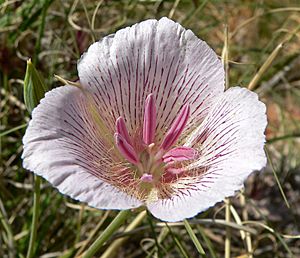Alkali mariposa lily facts for kids
Quick facts for kids Alkali mariposa lily |
|
|---|---|
 |
|
| Scientific classification |
|
| Kingdom: | Plantae |
| Clade: | Tracheophytes |
| Clade: | Angiosperms |
| Clade: | Monocots |
| Order: | Liliales |
| Family: | Liliaceae |
| Genus: | Calochortus |
| Species: |
C. striatus
|
| Binomial name | |
| Calochortus striatus Parish
|
|
| Script error: The function "autoWithCaption" does not exist. | |
| Synonyms | |
|
Calochortus comosus A.Nelson |
|
Script error: No such module "Check for conflicting parameters".
The alkali mariposa lily (Calochortus striatus) is a beautiful flower. It's a type of mariposa lily. You can find it growing naturally in California and Nevada. This plant is considered a vulnerable species. This means it needs protection to keep it from disappearing. The California Native Plant Society lists it as rare or endangered.
Contents
Where the Alkali Mariposa Lily Grows
Native Home in Deserts and Mountains
The alkali mariposa lily mostly grows in the Mojave Desert. This desert is a large area in the southwestern United States. You can also find it in places like the Antelope Valley. Other areas where it lives include the Kern River Valley. It also grows in the southern Sierra Nevada mountains. Look for it in the Amargosa Desert and Owens Valley. It even appears in Yosemite Valley and the eastern Transverse Ranges.
Favorite Growing Spots
This plant loves special kinds of soil. It grows best in alkaline soils. These soils have a higher pH level. You often find it in wet areas near water. These are called wetland-riparian areas. It also thrives in specific plant communities. These include Shadscale scrub and chaparral habitats.
What the Alkali Mariposa Lily Looks Like
Stem and Leaves
The Calochortus striatus usually has a short stem. It might only be a few centimeters tall. But sometimes it can grow much taller. It also has a long leaf at its base. This leaf often lies flat on the ground.
Beautiful Bell-Shaped Flowers
The stem can branch out about halfway up. Each branch holds a lovely bell-shaped lily flower. At the bottom of the flower are pointed sepals. These are like small leaves that protect the bud. Above them are three rounded petals. These petals are the colorful parts of the flower. They can be 2 to 3 centimeters long. Sometimes, their edges are slightly toothed.
Colors and Markings
The petals come in many shades. They can be very light to very dark pink. You might also see lilac or purplish colors. They often have darker pink or purple lines. These lines look like veins or mottled patterns. The center, or "cup," of the flower is a bit hairy. Inside, you'll find the anthers. These are the parts that hold pollen. They are bright to dull pink. The pollen itself is also pink. This beautiful flower blooms from April to June.
Fruit and Seeds
After blooming, the flower forms a capsule. This capsule is a type of fruit. It can grow up to 5 centimeters long. Inside the capsule, you will find flat seeds.
 | Kyle Baker |
 | Joseph Yoakum |
 | Laura Wheeler Waring |
 | Henry Ossawa Tanner |

